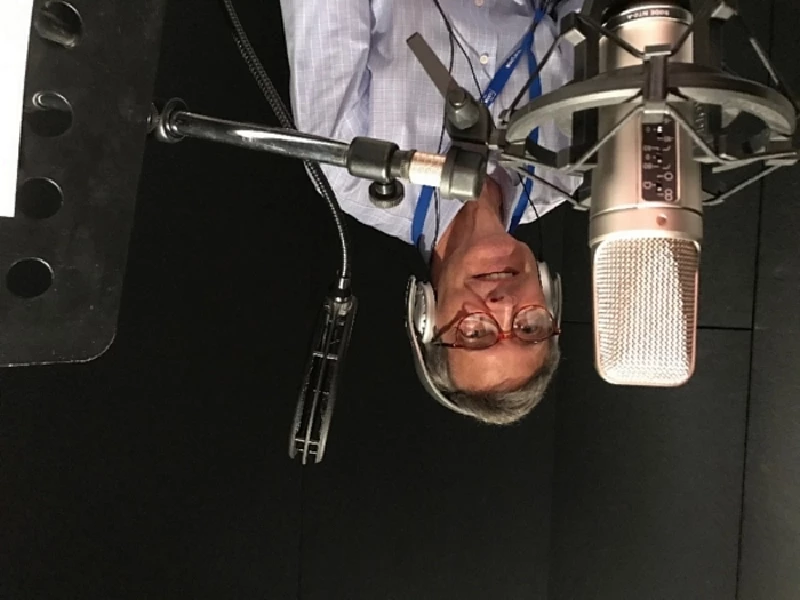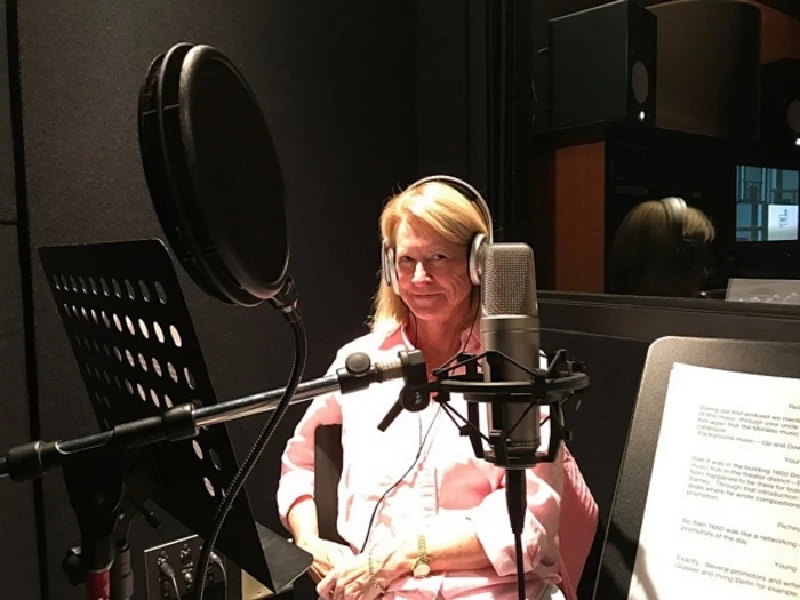Charlie Young - Interview
by Lisa Torem
published: 14 / 6 / 2019

intro
Imagine finding yourself suddenly responsible for bringing to life the captivating music of some of the earliest American recording artists. Charlie Young tells Lisa Torem how he did that and more with his 'Unheard of Jazz' podcast.
When former surgeon Charlie Young rolled down his sleeves and plotted out his plans for retirement, the ghosts of music past were already planning things. It turned out that his late uncle's publishing company Denton and Haskins required a minder, and Charlie was the man for the job. The company publishes music from, it says, the "turn of the 20th century through the early '50s". Its website [https://dentonandhaskins.com/] provides the swing music fan with historical facts, videos and an impressive client list, but Charlie didn't stop there. His 'Unheard of Jazz' podcast [https://dentonandhaskins.com/placement-examples#podcasts] features related topics unearthed in a lively Q & A format. How did these projects get started? And how can we find out more? Stay tuned for Pennyblackmusic's first interview with Charlie Young. PB: After inheriting your uncle's music publishing company, Denton and Haskins, what was your initial reaction? CY: There were a lot of years in between having the music company in the direct family. It first came to my father after his brother's death in 1968. When my father passed away in 2002 the companies officially came to my sister and me. All of us had other day jobs so there was little interest in the companies. We had hired a music attorney in LA to manage them and do whatever promotion she could, but mostly we just collected small but steady quarterly royalty checks after making distributions to artists. Distributions to the artists or their heirs were cut manually at times by myself, my sister and now my niece. As it is a small company, the chore is not too onerous. PB: You have been actively engaged in conceptualising and co-narrating the unique music podcast, "Unheard of Jazz". How did the idea for this podcast come about and how did you get involved with local radio? CY: It wasn't until I retired this past August that it really dawned on me that I was heir to such an interesting catalogue of material. Although I had an interest in music, my work as an eye surgeon was always my life. After retiring, though, there are only so many ways you can fill time. Each day is a challenge in terms of doing something productive with one's time. It didn't take long for me to realise that the material in the companies was really under-utilised. As well, when my uncle died suddenly due to a heart attack, he was the sole person running the company. My father had no time to run it so he just boxed everything in the office up. Those boxes had sat unopened for 50 years, filled with memorabilia. As I now slowly go through the material, I am also finding an occasional, misplaced contract. Seeing what was there, I began to wonder how I could let people know or hear some of the music, of which all had become lost artists. There were also songs from better-known artists that had been seemingly forgotten. This is how the idea of doing the podcasts was born. I found a partner in Cathy Richey who was interested and enthusiastic about the project. We discovered that our local library had a sound studio and found a sound engineer from the library bulletin board. After completing the first podcast, we sent it to the local jazz radio station [http://WUCF.org] and kept our fingers crossed. To our delight, they wrote back that they loved the podcast and would like to use it. In discussions with them, we are now collaborating with them for the series "Unheard of Jazz", where Cathy and I are producers and provide the artistic input and WUCF provides the editing, studio, and sound engineer. PB: In a recent podcast about orchestral music, you and Cathy discuss the talents of African-American bandleader Bob Redmond. You tell us that Redmond's band was unique in that each member was given the opportunity to play a solo. Was that a big deal at the time? CY: I can't really add too much more about Redmond's band. It was apparently unusual to give each member of the band an opportunity to play solo but Redmond was also apparently very innovative in his arrangements, particularly in harmony and rhythm. He would play the brass and reed sections off of each other in a call-response pattern and move the melody around different sections of the orchestra and to different soloists. This became the pattern of many of the big bands thereafter but he seems to have been the originator. PB: You and Cathy mention that the musician's union sponsored a recording ban during World War 2, triggered by the advent of "canned music". Can you explain how this phenomenon affected airplay and the daily lives of American musicians during this time period? CY: Airplay was affected in that soon the stations ran out of recorded music even though they had stocked up on some prior to the "strike". The musicians struck because they were being replaced by recorded music and they wanted a royalty fund from that to pay for those out of work. During the ban, singers were excluded from the strike so there were stations playing solo singers with instrumental accompaniment. PB: A number of songs from the Denton and Haskins catalogue have been used in American films and commercials. How do clients find you? CY: I wish there were more but one of the ones I like best was a remake of 'Holiday Mambo' which was renamed 'Do You Only Wanna Dance' for the movie "Dirty Dancing: Havana Nights". The remake has become quite popular. Both the original and the remake are very good. Artie Shaw's 'Summit Ridge Drive' was used in Clint Eastwood's film "Flags of our Fathers" and Jimmie Lunceford's song 'Dream of You' was used in Brad Pitt's and Angelina Jolie's work "By The Sea". It isn't easy to have the material used. Many of the major film companies now own large catalogues so our material is often overlooked. It seems to me it has mainly been used when an independent producer comes along and the music supervisor probably has a freer hand to look for some of the lesser-heard material. Some of the people know about our company through our LA music attorney and manager Sindee Levin. PB: In one of your earliest podcasts, you feature the work of singer, pianist and composer Una Mae Carlisle and you discovered that The New Orleans Jazz Museum only had access to a single recording, though Una Mae wrote about 500 songs. Why do you think such a prolific entertainer's work has been so difficult to track? CY: I think her death at an early age was the main factor as to her being unknown today. Also, recording contracts were not as common as they are today, even if the artist was known at the time. She broke the colour barrier: she was the first black artist to have a coast-to-coast radio show on a major network, WABC. It is my understanding they did some background research to see if she would be accepted around the country and found little to no objections so they placed her show on over 100 affiliate stations and it became quite popular. PB: A recent podcast focuses on Latino music and an artist known as "Machito, the "father of salsa." Can you explain the "Machito beat?" What is the origin of the saying, "There's no dead suits?" CY: The Machito beat makes use of a 2-3 rhythm or a 3-2 rhythm or variation thereof where two fast beats are then followed by three slow or vice versa. In Machito's band, somewhat like Bob Redmond's, he would give each member a chance to play a solo, though not necessarily on every night. Because of that, each member was sure to keep their suit clean and pressed as they might be called on for a solo. In that way he used the term, "there were no dead suits." PB: The list of clients your uncle, Barney Young, served is impressive. Are there any famous people from his day yet to be featured on the podcast? CY: There is one anecdote I love about Mezz Mezzrow. Mezz was also known as a fixer in that he came to supply many members of bands with marijuana. In fact, "Mezz" became one of the nicknames for grass at the time. When Mezz was at a jazz club at the 1939 World's Fair in New York he was arrested for distribution of the drug and sent to prison. When he arrived at the prison the warden said he was waiting for Mezzrow as the prison band needed a band leader. I know this to be true as I have a letter from Mezzrow to my uncle dated May 19, 1941, stating, "I feel pretty good since my incarceration, although I'm fresh from the hospital having been treated for a pleuritic condition and am doing splendid". He goes on to say: "I am the director of the band here, Barney, and in need of some orchestrations. If you could pick up a few and mail them I'd be grateful." PB: Do you know who's listening to the podcast? What are your plans for increasing your fan base? CY: You know, I don't know how to answer that exactly. Whatever the listening base for WUCF is in Orlando would be our main demographic though we have placed the first two podcasts on YouTube and also on the company website [https://dentonandhaskins.com/placement-examples#podcasts]. PB: If you could go back in time and interview an "unheard of" or "heard of' swing musician, who might that be and what topic would most pique your interest? CY: Oh, gee, there are so many but probably I'd most like to talk with Artie Shaw and discuss his philosophy of music and what really caused him to disavow the traditional sound of his time. PB: Thank you.
Band Links:-
https://dentonandhaskins.com/placement-examples#podcastsPlay in YouTube:-
Picture Gallery:-

most viewed articles
current edition
Carl Ewens - David Bowie 1964 to 1982 On Track: Every Album, Every SongArmory Show - Interview with Richard Jobson
John McKay - Interview
Colin Blunstone - Thalia Hall, Chicago, 16/7/2025
Bathers - Photoscapes 1
Billie Eilish - O2 Arena, London, 10/7/2025
Loft - Interview
Visor Fest - Valencia, Spain, 26/9/2025...27/9/2025
Sir Tim Rice - Interview
Robert Forster - Interview
previous editions
Manic Street Preachers - (Gig of a Lifetime) Millennium Stadium, Cardiff, December 1999Heavenly - P.U.N.K. Girl EP
Beautiful South - Ten Songs That Made Me Love...
Peter Perrett - In Dreams Begin Responsibilities Interview Part One
Boomtown Rats - Ten Songs That Made Me Love....
Oasis - Oasis, Earl's Court, London, 1995
Coldplay - Wembley Arena. London, 16/8/2022
Prolapse - Interview
Trudie Myerscough-Harris - Interview
Pixies - Ten Songs That Made Me Love...
most viewed reviews
current edition
Davey Woodward - Mumbo in the JumboSick Man of Europe - The Sick Man of Europe
Lucy Spraggan - Other Sides of the Moon
Amy Macdonald - Is This What You've Been Waiting For?
Suzanne Vega - Flying With Angels
Blueboy - 2
Bush - I Beat Loneliness
Phew, Erika Kobayashi,, Dieter Moebius - Radium Girls
Alice Cooper - The Revenge of Alice Cooper
Cynthia Erivo - I Forgive You
Pennyblackmusic Regular Contributors
Adrian Janes
Amanda J. Window
Andrew Twambley
Anthony Dhanendran
Benjamin Howarth
Cila Warncke
Daniel Cressey
Darren Aston
Dastardly
Dave Goodwin
Denzil Watson
Dominic B. Simpson
Eoghan Lyng
Fiona Hutchings
Harry Sherriff
Helen Tipping
Jamie Rowland
John Clarkson
Julie Cruickshank
Kimberly Bright
Lisa Torem
Maarten Schiethart